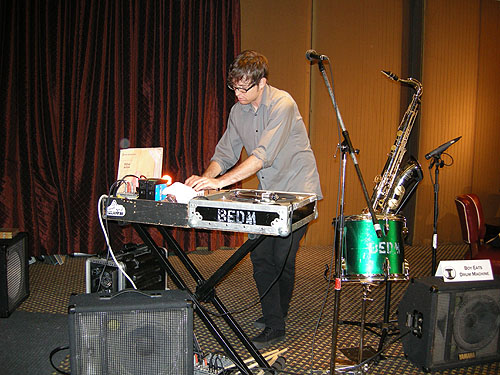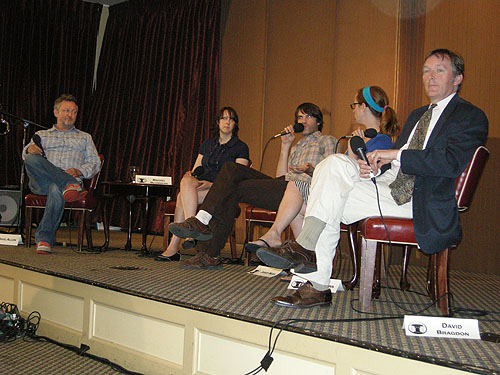 The City Club of Portland explored the city’s indie music scene with a forum on Friday featuring four local musicians and Metro President David Bragdon as moderator. What exactly is it about Portland that is encouraging so many musicians to move to the area, and how can the city capitalize on this community asset?
The City Club of Portland explored the city’s indie music scene with a forum on Friday featuring four local musicians and Metro President David Bragdon as moderator. What exactly is it about Portland that is encouraging so many musicians to move to the area, and how can the city capitalize on this community asset?
BY EMMA HALL
Alternating between saxophone, drums, vocals and turntables, the one-man musical stylings of Boy Eats Drum Machine (Jon Ragel) made quite an unusual act to grace the stage of the elegant Governor Hotel Grand Ballroom. Older regulars in business attire nodded along to the music as they shared tables with young Portland musicians at the Portland City Club Friday Forum on July 9. “Small city, big scene,” an exploration of Portland’s indie music scene, was the topic of the lunch.
 |
Boy Eats Drum Machine |
Metro Council president and self-proclaimed music enthusiast David Bragdon moderated the panel. It featured four local guests: founding member of Gang of Four and co-founder and president of Pampelmoose Dave Allen; local musician Rachel Blumberg of the Decemberists; local artist and owner of record label Tender Loving Empire Jared Mees; and folk singer-songwriter Laura Viers.
The idea for this Friday forum topic came from the New Leaders Council, a group of young members. “I think it is a great new idea,” said City Club Research and Policy Director Tony Iaccarino while surveying the lunch crowd. “The topic definitely brought in some new faces, yet the same old regulars are here too.”
Bragdon opened the forum with one of his characteristic jokes: “I think that maybe you thought there was a mistake in communication and you’re here to hear me talk about the urban growth boundary and the Columbia Crossing. But actually what I decided is you’ll probably enjoy this [topic] a lot better-and I know that I will.”
 |
(L-R) Dave Allen, Rachel Blumberg, Jared Mees,Laura Viers, David Bragdon |
The panelists all agreed that Portland has become a mecca for musicians and artists, and the quality of life is drawing many more musicians to the area.
“[Portland] is a great place to live for musicians because it’s not terribly expensive yet,” Viers said. “Lots and lots of musicians are moving here for that reason.”
The panelists said that while on tour, everyone they talk to seems to express interest in moving to Portland, or knows another musician who is moving to the area simply because of the independent music scene.
“[Independent music] means taking something in your own hands and making it become what you want it to become,” Blumberg said. “Don’t take things too seriously… and Portland has a bit of unreality, we live in a bit of a dream world [here].”
This magnetism has further fostered a community for musicians now that so many artists live here. “In terms of collaborating and making music, it’s very easy here,” Blumberg said.
Now that so many musicians live in the area, the panelists implored the city to capitalize on this asset and follow in Austin’s footsteps.
“The city of Portland is in a pretty unique position to actually treat our music like an export in a way, and the city could make quite a bit of money by supporting Portland music, the same way that Austin is the live music capital of the United States,” Mees said.
Bragdon joked that the Portland version of Austin City Limits could be called the Portland Urban Growth Boundary, and he nominated himself as host.
The panelists all had similar ideas as to how the city of Portland can support its local music scene, ranging from small handouts to free health care. The ideas encompassed everything a struggling musician could dream of, but lacked specifics as to how the ideas could actually be funded and implemented.
The music industry officially generates about $158 million annually in statewide earnings and employs about 4,500, but those figures don’t capture the constant influx of artists pouring into Portland to be part of the scene.
“There should be as much support as possible for all creative arts in Portland, because it is a big driver of our economy,” Allen said. “The music scene is much bigger than we seem to understand at times, especially with its financial impact.”
He described the money that independent music brings to Portland’s economy. Shows are booked every night at numerous local clubs, who in turn employ people as bartenders, doormen or promoters.
Viers suggested the city help by providing grants for struggling musicians to print CDs or rent a van for touring. “I think we [should] follow the Canadians or Europeans in some sense and have some more governmental support from the city for small grants,” Viers said.
The unanswered question remains how Portland musicians can earn sustainable living wages while pursuing their art. “The monetary aspect of music in Portland is still very undefined and loose,” Blumberg said.
“There’s not really a need to make money off of your music right away because the cost of living is so low here,” Mees agreed.
Bragdon reminded the panelists that although it is great that Portlanders are making music because they want to, rather than because they want to make money off of it, we still need to develop a sustainable economy somehow.
“We can’t build a competitive city off the base of ‘well, we’re just a cheap place to live, and everybody’s going to live ten to a house,'” Bragdon said.
Read our previous coverage of the Portland indie music scene here, or listen to an audio recording of the event at the City Club website.
Emma Hall is web editor for Oregon Business.


